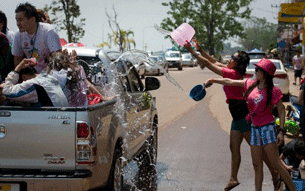Laos: Marriage conditions tightened
| Publisher | Radio Free Asia |
| Publication Date | 21 August 2012 |
| Cite as | Radio Free Asia, Laos: Marriage conditions tightened, 21 August 2012, available at: https://www.refworld.org/docid/503def8b2.html [accessed 31 May 2023] |
| Disclaimer | This is not a UNHCR publication. UNHCR is not responsible for, nor does it necessarily endorse, its content. Any views expressed are solely those of the author or publisher and do not necessarily reflect those of UNHCR, the United Nations or its Member States. |
2012-08-21
Laos moves to close a loophole in marriages exploited by human trafficking syndicates.
 Laotian girls throw buckets of water on colleagues during the water festival celebrations in Vientiane, April 13, 2012. AFP
Laotian girls throw buckets of water on colleagues during the water festival celebrations in Vientiane, April 13, 2012. AFP
The Lao government is tightening conditions under which foreigners marry local women in a bid to combat human trafficking, according to officials.
Under new rules introduced recently, foreigners wanting to marry local women should be a resident in Laos for at least three consecutive months and have to provide a variety of personal documents for the government to conduct background checks, the officials said.
The stringent conditions are aimed at plugging the marriage loophole that foreign human trafficking syndicates have been using to smuggle Lao women out of the country.
The foreigners quickly get married with local women in Laos and then take them to their countries where the women are forced into prostitution and other illicit activities, the officials said.
"The government has just issued a new law that basically states that if a foreigner wants to marry a Lao girl, he must stay in Laos for three months to obtain proper documents, not just obtain documents and then leave," a Lao anti-human trafficking officer told RFA's Lao service.
"Many women have been missing and sold," the officer said, without giving details on the foreign human trafficking syndicates that are linked to such marriages and smuggling Lao women.
The officer said that under the new rule, a foreigner who wants to marry a Laotian has to submit documents of "his nationality, background and other necessary information to Lao authorities."
"The authorities will investigate and the investigation will take at least three months. If the foreigner is trustworthy, he will be allowed to marry [much] faster; but if [the application is] in doubt, the marriage will be delayed or never permitted."
Smuggling rings
In recent months, officials have exposed foreign sex rings smuggling Lao women to China, Thailand, and Malaysia.
In May, the government reported that hundreds of girls have been trafficked into China from the northern provinces of Laos.
One official had said that over the past two years, hundreds of families from provinces bordering China had approached the government requesting help in locating their missing daughters.
The girls, many of them from the ethnic Khmu minority, were lured with the prospect of work, or had married Chinese nationals.
Human trafficking rings are also increasingly using Thailand as a transit country to send Lao girls to Malaysia where they are sold into prostitution, according to a Lao official, also in May.
Based on statistics provided by the immigration bureau of Thailand's Songkla province, which borders Malaysia to the north, 48,000 Laotians crossed into Malaysia in 2011, but only 46,000 returned.
Some 35 percent of Lao nationals trafficked to Thailand end up in prostitution, U.N. figures have shown.
Across the border
Earlier this month, a Thai official claimed that more than 500 underage Lao girls are working as sex slaves in eastern Thailand, saying that authorities in both countries need to step up the fight against human trafficking.
Chuvit Kamolvisit, a Thai member of parliament and advocate for social issues, said that the girls, aged 13 to 18 years, were discovered in a karaoke bar in the Chachoengsao district of Chachoengsao province.
But Thai Deputy Prime Minister Chalerm Yubamrung denied Chuvit's claims in a statement to the Thai media, saying no such karaoke bar existed.
He called on Lao officials to take measures which included more scrutiny of Lao girls traveling to Thailand to look for work and targeting officials who have assisted traffickers.
A Lao draft law on human trafficking is currently under review and is likely to be put into law by 2014, officials have said.
The U.S. State Department maintained Laos at "Tier 2" in its annual report on human trafficking in June, saying it does not fully comply with minimum standards for protecting trafficking victims, but that it is making significant efforts to comply with those standards.
Reported by Sidney Khotpaya for RFA's Lao service. Translated by Max Avary. Written in English by Parameswaran Ponnudurai.
Link to original story on RFA website
